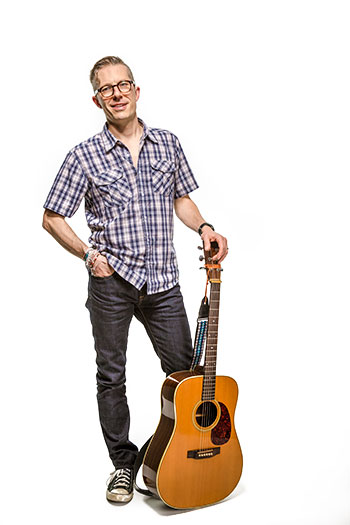In preparation for this interview, I googled your name and spent about an hour on jeffwhittington.com before I realized it wasn’t you, that you weren’t the North Carolina banjo champion.
That’s not me. That’s a different Jeff Whittington, obviously. Are we rolling?
Yes, we’re rolling. What’s the title of the new album?
We’re going to go with Whittington.
Just Whittington? That is so cocky.
It’s kind of like Van Halen. But not really. It’s not at all like Van Halen. But just using the one name is kind of like that. So I feel good about it.
Stuart Sikes, who also has produced The White Stripes, produced this album. Did he bully you in the studio? It’s hard for me to imagine you saying, “I see what you’re saying, Stuart. But I’m Jeff Whittington.”
Or just “I’m Whittington.” [laughs] I asked Stuart at the Old Monk to record this record, and he agreed. It’s just great to work with him, because he is completely honest. He played a huge role in how these songs sound, even how they were arranged. I’m really, really happy with what we ended up with.
One critic described your performance on Whittington as “Rhett Miller meets Nine Inch Nails.” How would you respond to that?
Really? Which critic said that?
Okay, no critic said that. Just tell me how you’d describe the sound.
I decided that for this project—and I’ve got a band together for the release—I decided that I’m old enough now that I don’t want to carry a heavy guitar amp. So there’s plenty of acoustic guitar.
Literally, light music.
[laughs] I don’t think it’s light music. It’s really hard for me to talk about my own songs. As a songwriter, I’ll write a song and I’ll perform a song and it means something to me. And I hope that if someone listens to that song, they can attach their own set of images to that song. It’s their own internal movie that they watch when they hear a song. And I just don’t want to put anything on somebody’s interpretation of a song. When I finish a song, it feels like a huge breakthrough for me. And that’s why I’m really excited about finishing this record. It has 12 songs on it that are all finished. Finished, rather than abandoned. Believe me, there are plenty of pieces of songs along the road, in the past, for me.
You toured with Adam’s Farm for about four years in the early ’90s. What’s it like making and performing music as an old fart, versus when you were a younger dude and didn’t have hip problems like you do now?
That’s why I don’t want to carry a heavy guitar amp to a bunch of shows. First of all, the idea of being in a van for 30 straight days and playing 20 shows—I mean, it’s a romantic idea, but it’s really hard work.
Your sister station is KXT 91.7. Is Whittington going to be on heavy rotation there?
I don’t have any idea at all. It’s kind of like if somebody here at the station wrote a book about something, would we automatically interview them on KERA? It’s not something that I have any influence on. That’s just not how it works.
Onstage, you come across like a rock star. But then you’re this mild-mannered, mellifluous broadcaster during the day. You produced the legendary Glenn Mitchell, who died in 2005. And then you produced Krys Boyd, who with Think has become something pretty special to Dallas. Was that a difficult transition?
It’s the wrong phrase to say you work to their strengths. But it’s also the right phrase. Most of what we do is about engaging people and giving people the opportunity to tell their stories. There are certain things that certain hosts are great at covering, and there are certain things that they aren’t great at. It’s like working with anybody. If you’ve worked with different editors, you learn how to work with that person. What was tough was suddenly and shockingly losing Glenn.
You also do a show on Fridays called Anything You Ever Wanted to Know, a call-in question-and-answer show. You sometimes get calls from people who ask questions that suggest they have never heard of the internet. How do you handle those calls in that kind Jeff Whittington voice without telling them, “Would you please go [redacted] google that?”
[laughs] Well, I mean, you know, it’s about community, the show. Public radio is about people sharing ideas in a very considerate way. That’s what we do. That’s why people listen. And you can’t google everything.







